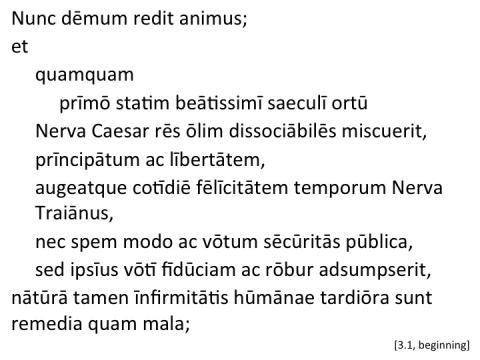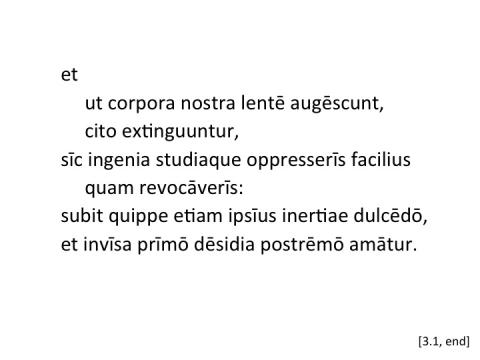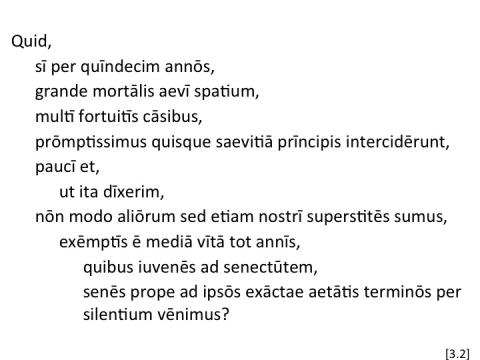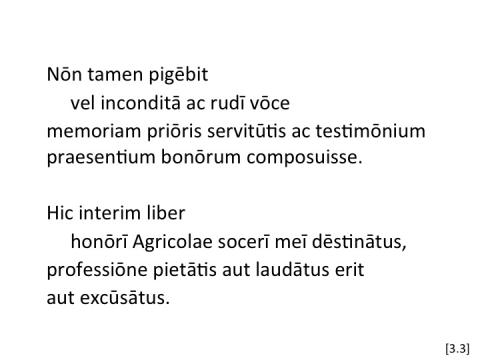Overview: A brighter day has dawned. Yet the intellectual life so long stifled revives but slowly. At some future time I shall do my poor best to write a history of past bondage and present freedom. This book is a tribute of affection and should not be viewed with the critic's eye. (Stuart)
3.1
redit: progressive present. (Stuart) [A&G 465]
et: in translation equal to sed or et tamen; in various passages in Tacitus et has this adversative sense. See chapters 9.3, 36.3. (Stuart) et quamquam = quamquam autem. So ch. 36.3. quamquam with the subjunctive occurs sixty times in Tacitus, to twenty instances with the indicative. (Gudeman) [A&G 527e]
prīmō statim: as we say in English with equal redundancy, "the very first." (Stuart)
ortū: metaphorical, like our “dawn of a new era.” (Stuart) prīmō statim ... ortū: “at the very beginning of the dawn.” prīmō statim occurs repeatedly in Tacitus. (Gudeman)
saeculī = aetātis. (Pearce)
Nerva Caesar: an aged senator who was chosen emperor after Domitian's death and reigned from September 18, 96 to January 25, 98. He was a weak administrator, but a man of good purpose, and his accession marked the beginning of better times. (Stuart); the references to Trajan, below and 44.5, imply the death of Nerva (Jan. 27, 98 CE). Divus was probably omitted, because the official consecration had not yet taken place. (Gudeman)
ōlim: “long since.” (Pearce)
dissociābilēs: “mutually exclusive.” (Stuart); here passive = īnsociābilēs, “incompatible.” (Pearce); in this sense only here and Claudian, in Rufinum 2.238. The same negatival force of the prefix is found, e.g., in dissimilis, displicere. (Gudeman)
prīncipātum ac lībertātem: we may take this as Tacitus' ideal government. (Pearce); the antithesis seems to have been a commonplace. The word libertas appears on inscriptions in reference to the accession of Nerva. (Gudeman)
Nerva Traianus: Marcus Ulpius Traianus was adopted by Nerva in 97, and reigned from 98 to 117. He was one of the best and ablest of the emperors. (Stuart)
spem ... ac vōtum: grammatically these words depend on adsumpserit, which, however, logically is connected with fiduciam ac robur only. This usage is called zeugma; “he has not only indulged in hopes and prayers.” (Stuart)
sēcūritās pūblica: a personified abstraction; public tranquillity is represented as offering vows for "her" continuance. A modern writer might imagine the Goddess of Liberty praying that freedom might endure. (Stuart); like our Commonwealth, is frequently personified, especially on coins. Vota were vows and prayers offered up for the continued welfare of the state on the occasion of the accession of a new emperor. So recorded e.g. in the case of Trajan, Jan 3, 98 CE. Some verb like concēperit must be supplied by zeugma from adsumpserit. (Gudeman)
fīdūciam ac rōbur: Securitas has become confident that her prayers will be realized and hence has gained a firm footing. (Stuart); strong assurance of the realization of the prayer. Hendiadys, although the two nouns were primarily used for the sake of symmetry with spem ac votum. (Gudeman)
adsumpserit: (adsumere: “to take to oneself”) applies strictly only to voti fiduciam ac robur in the sense of “has realized.” With spem ac votum it has a rather different meaning, "has allowed itself to frame" hopes and prayers. The climax is reached through the stages: hope, hope formulated in prayer, confidence in the fulfilment of the prayer, its substantial fulfilment (robur). (Pearce); taking adsumpserit as an instance of zeugma leads to some trouble, since it requires the reader to supply in thought a verb for the first clause (such as concēperit or fōverit) and to interpret adsumere rather loosely in the second. It has been variously emended, including by Woodman to aetās suāserit. (Lahiri)
tardiōra: “slower to act.” (Pearce)
augēscunt, extinguuntur: notice the asyndeton, which is regular in contrasts. (Pearce); an asyndetic antithesis, the adversative particle being, for the sake of conciseness, generally omitted. So e.g. ch. 12.5, tardē mītēscunt, cito prōveniunt. (Gudeman)
oppresserīs: potential, with indefinite subject; "it is easier to crush creative talent and intellectual pursuits than to call them back into being." (Stuart) [A&G 447.3]
subit: sc. animum. Apparently not elsewhere used absolutely in this sense. (Gudeman); “steals upon one.” (Stuart); “steals over us,” a poetical use of subeo. (Pearce).
quippe = enim, so very frequent in Tacitus, but in anastrophe only here and in the Annals. (Gudeman)
3.2
quid: the main verb and subject of this sentence must be supplied by the reader, e.g., "can one expect?" (Damon) quid si: a rhetorical way of introducing a more forcible argument. (Pearce); usually introduces a concrete illustration of a general proposition. (Gudeman); this formula introduces the clinching explanation of the slow revival of literary activity. The thought is: “what can one expect when one considers that the best have been killed and the few survivors are out of practice?” It is left to the reader to supply the self-evident answer: “the outlook is not promising.” (Stuart)
per quīndecim annōs: Domitian reigned from 81 to 96 CE. (Stuart)
grande ... spatium: the adjective is justified by the succeeding illustration of the changes possible in fifteen years. (Stuart); so styled, because of the crushing effect upon those who lived through these dreadful times. (Gudeman)
multī ... promptissimus quisque ... paucī: notice the asyndeton. (Gudeman)
paucī, etc. ... : “while we that remain are but few and have outlived.” (Pearce)
fortuitīs cāsibus: death by the visitation of Providence, not by external violence. (Stuart); “owing to natural causes.” Tacitus means to say that during the reign of terror most of the illustrious men capable of telling its story had died a natural or violent death, while the few that survived were too crushed in spirit and unlike their real selves to undertake the task. (Gudeman)
intercidērunt: inter- gives the idea of a course cut short before completion; see interficere, intercipere. (Pearce)
prōmptissimus quisque: "the leading spirits"; promptus signifies one who is mentally alert as well as one who is ready in action. (Stuart); the plural verb after quisque, with or without the superlative, is found in all periods of the language, but is comparatively rare in classical prose, except in Livy. (Gudeman)
ut ita dīxerim: an apology for the paradoxical nostrī superstitēs. What case is nostri? (Stuart); the potential use of the perfect (instead of the present) in subordinate clauses is post-classical. (Pearce) [A&G 447.1]; a post-Augustan phrase for ut ita dicam. (Gudeman)
exēmptīs, etc.: 15 years are a large part of a mature life. A man was iuvenis till 45; at 60 he would be senex. (Pearce) exēmptīs ē mediā vītā tot annīs: elsewhere in Tacitus eximere invariably takes the dative. mediā vītā is an elastic term. Thus in ch. 44.2, it is applied to Agricola, at the age of 54. According to a belief common among the Romans, 120 years constituted the extreme natural limit of human life. Tacitus himself was about 26 years old on the accession of Domitian (81 CE), and therefore but 41 at Domitian's death. Senectus usually began at the age of 60. (Gudeman)
iuvenēs ad senectūtem: theoretically the forty-sixth year was the dividing line between iūniōres and seniōrēs. Tacitus was about forty-two when Domitian died, hence, would fall only approximately in the category of those who had passed their prime. (Stuart)
exāctae aetātis: the genitive defines terminōs. (Pearce) [A&G 344] ipsōs exāctae aetātis terminōs: “to the very limits of extreme old age.” Such fullness of expression, still frequent in the minor writings of Tacitus, gradually disappears in the later works. (Gudeman)
per silentium: “in silence.” Per, of a course pursued; see note on 6.1 per mūtuam cāritātem. (Pearce); i.e. in compulsory silence, because of the danger to which an honest historian or biographer would have exposed himself. (Gudeman)
3.3
tamen: in spite of the handicaps just described. (Stuart)
non ... pigēbit = iuvabit (Pearce); litotes. (Stuart)
inconditā ac rudī vōce: "in a style untutored and crude"; an apology elicited by the fact that he is about to make his first essay in historical composition at a time when he still is conscious of mental torpor — or affects to be. (Stuart); “a characteristic of prooemia, and frequently found in the most artistically elaborated works.” For the pleonastic expression see note on 13.3 et in rem publicam. (Pearce, quoting Gudeman); these terms are habitually used of an archaic and inartistic diction, but as the Histories here alluded to — they were not completed till 109 CE — are written in a style of consummate art, these epithets must not be taken too seriously. (Gudeman)
testimōnium: memoria could not have been used with praesentium bonorum, because the still uncompleted reign of Trajan was included among these. But, when the Historiae had been published, their author had decided to reserve the record of Nerva's and Trajan's beneficent rule for an independent work, a plan either abandoned or frustrated by his death. (Gudeman)
composuisse: perfect, because the satisfaction will be that of having finished the work. (Pearce) [A&G 486.b]
interim: i.e. pending the conclusion of my larger and strictly historical narrative. (Gudeman)
honōrī ... dēstinātus: this dative marks a step on the way to the “predicative dative” with esse (see note on obtrectātiōnī, 1.3). In both the dative comes from the idea of "direction," but here the idea is better marked by the more definite meaning of dēstinātus. (Pearce) [A&G 382]; the eulogistic aim of the biography is here plainly stated. (Stuart)
professiōne pietātis: the abl. is one of cause. Literally: “owing to my plea of dutiful affection,” i.e. as a proof of my filial love. (Pearce) [A&G 404]
laudātus erit aut excūsātus: the fut. perf. with reference to the reader's completed perusal of the biography. (Gudeman) [A&G 478] excūsātus: the artistic imperfections of the book will be pardoned because of the motives that led to its composition. (Stuart)




